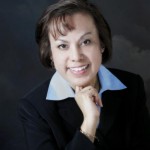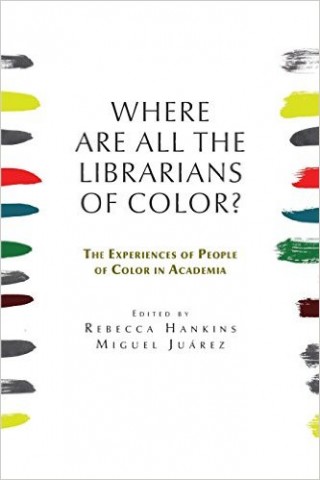[et_pb_section admin_label=”section”][et_pb_row admin_label=”row”][et_pb_column type=”4_4″][et_pb_text admin_label=”Text” background_layout=”light” text_orientation=”left” text_font_size=”13″ text_line_height=”1.5em” use_border_color=”off” border_color=”#ffffff” border_style=”solid”]

This is a guest post by Martha Parker. Parker is currently the Digital Services Librarian at the University of Arkansas Libraries. While writing “Establishing a Communal Network for Professional Advancement among Librarians of Color,” she was the Librarian in Residence at the University Libraries. Parker received an MLIS in 2011 from University of North Carolina at Greensboro, where she also received the prestigious UNCG’s Academic and Cultural Enrichment (ACE) Scholarship, a Laura Bush 21st Century Librarian Program funded by a grant from the Institute of Museum and Library Services and the UNCG-LIS department.
Parker has served on several local and national committees including serving as a Charlotte representative for the UNCG’s MLIS program, as an ALA-IRRT (International Relations Roundtable) member, and as a REFORMA member. Since 2012, she has led the REFORMA Organizational Development and New Chapters committee, and was the chair of the ACRL’s Diversity Committee from 2014-2015. She has been a driving force in promoting the 2012 ACRL’s Diversity Standards for Academic Libraries, primarily during presentations at conferences, through the creation of a diversity video and diversity LibGuide at the University of Arkansas, and by leading in the creation of the ACRL’s Diversity Standards for Academic Libraries Toolkit.
[/et_pb_text][et_pb_text admin_label=”Text” background_layout=”light” text_orientation=”left” text_font_size=”14″ use_border_color=”off” border_color=”#ffffff” border_style=”solid”]

One of the most remarkable memories from my three and a half years as the Librarian in Residence at U of A was Rigoberta Menchú’s visit to campus last October. Menchú, a 1992 Nobel Peace Prize winner, provided a strong example of strength and determination to those who attended her various events. She demonstrated that is possible to overcome economic and educational barriers to encounter ways to improve her own life, and the lives of the Guatemalan indigenous community, by providing exposure to past experiences.
In my capacity as the chair of the Association of College and Research Libraries’ (ACRL) Diversity Committee during the 2014-2015 academic year, I had the pleasure of working with a team of people to concretize my experiences and contribute a chapter to Where are all the Librarians of Color? The Experiences of People of Color in Academia, edited by Rebecca Hankins and Miguel Juárez.
The book, published last month by Library Juice Press as part of a series on Critical Multiculturalism in Information Studies, offers “a comprehensive look at the experiences of people of color after the recruitment is over, the diversity box is checked, and the statistics are reported.”
This book explores the retention rates, job satisfaction, and tenure experiences of librarians of color though the history of librarians of color in academia, reviews of the literature, obstacles, roles, leadership, and the tenure process.
Where are all the Librarians of Color? is a compilation of essays written by librarians who have contributed to the Diversity efforts of the American Library Association and its divisions, including REFORMA (The National Association to Promote Library & Information Services to Latinos and the Spanish Speaking) and the ACRL.
In our chapter, “Establishing a Communal Network for Professional Advancement among Librarians of Color,” I guide members of the ACRL Diversity Committee, including Tarida Anantachai, Latrice Booker, and Althea Lazzaro, in sharing experiences and sometimes, the strategies created by the committee, in our efforts to generate networks for professional advancement in academic libraries.
I wrote of our work, “The authors of this chapter themselves have informally gained mentors by attending conferences and volunteering on professional committees. By volunteering on the ACRL Diversity Committee, for example, they have established a support network and have become informal, yet valuable peer mentors for each other. The trust built by working together on a national committee has led to further advantages, such as collaborative publications and presentations and other forms of professional engagement and portfolio-building. Through these collaborations, however, invaluable relationships and support systems can be formed, even if the term ‘mentor’ is not officially uttered between colleagues.”
Part of the chapter is also devoted to exploring the efforts of the University of Arkansas Libraries’ own diversity committee to promote diversity programming to enhance the experiences of all constituents while attending the university.
Hankins and Juarez write in their introduction that our chapter, “examines the ways in which collaborative partnerships among librarians of color, within and even across institutions, can greatly assist in job satisfaction, retention of professionals, and bolstering librarians’ sense of support throughout their careers. The essay also provides specific examples and models in which these collaborations have occurred, including those that the authors have experienced and, in many cases, initiated.”
Leveraging existing networks and creating collaborative partnerships are essential to librarians of color who might find themselves as one of the few, if not only, professionals of color within their home libraries; thus, contributing to a work environment that is conducive to meaningful and creative work.
[/et_pb_text][/et_pb_column][/et_pb_row][/et_pb_section]
